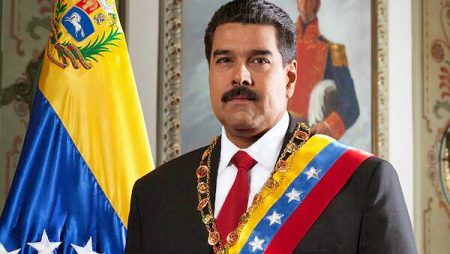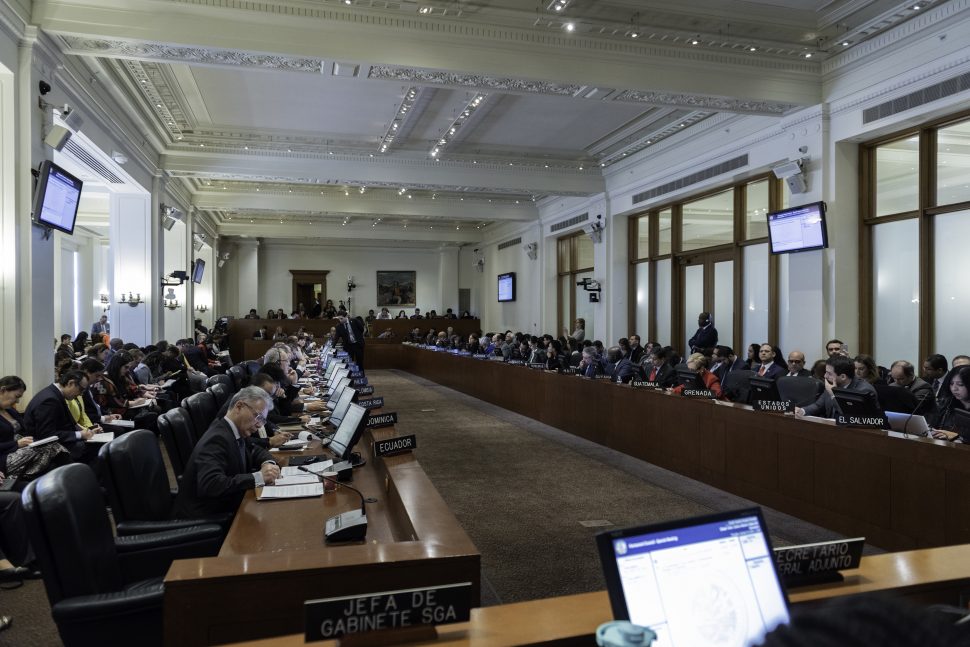Guyana was one of 19 members of the Permanent Council of the Organization of American States (OAS) that voted in Washington, DC on Thursday “to not recognize the legitimacy” of Nicolas Maduro’s new term as President of Venezuela.
The vote was on a resolution, sponsored by Argentina, Brazil, Chile, Colombia, Costa Rica, Paraguay, Peru and the United States, arguing that since the OAS General Assembly declared that the May 20th, 2018 electoral process in Venezuela lacked legitimacy, new presidential elections, with all necessary guarantees of a free, fair, transparent, and legitimate process, should be held at an early date attended by international observers.
Up to last night, Georgetown was yet to issue a statement explaining its vote, which will be seen as the strongest stand taken at the OAS against Venezuela in recent years. It comes in the aftermath of a recent Venezuelan incursion into Guyana’s waters, which is believed to be a direct threat to the broad oil exploration and development works being undertaken by ExxonMobil in Guyana’s waters.

In the facing of continuing aggression, Guyana last year initiated proceedings before the International Court of Justice to confirm the legal validity and binding effect of the 1899 Arbitral Award on the boundary between the two countries in order to resolve the controversy following Venezuela’s contention that the arbitral was null and void.
As has been the case in the past in relation to Venezuela, the membership of the Caribbean Community (CARICOM) was divided during the vote by the OAS Permanent Council. The 19 votes cast in favour of the resolution included votes from five CARICOM countries—the Bahamas, Guyana, Haiti, Jamaica and Saint Lucia—while three CARICOM states—Dominica, Saint Vincent and the Grenadines and Suriname—voted against it.
Additionally, there were eight abstentions, which included St. Kitts and Nevis, Trinidad and Tobago, Antigua and Barbuda, Barbados and Belize. Grenada was absent.
According to the resolution, the electoral process did not have the participation of all Venezuelan political actors, failed to comply with international standards, and was carried out without the necessary guarantees for a free, fair, transparent, and democratic process. As a result, it says the 2019 to 2025 presidential period beginning in Venezuela on the 10th of January of 2019 is the result of an illegitimate electoral process.
The resolution has also condemned in the strongest terms the arbitrary detentions, lack of due process and the violation of other human rights of political prisoners by the government of Venezuela and underscored that the Permanent Council and the Meeting of Consultation of Foreign Ministers remain ready to engage in diplomatic initiatives, including good offices, aimed at promoting dialogue in Venezuela, with a view to arriving at a political solution to the crisis in that country.
The Permanent Council has additionally reaffirmed that only through a national dialogue with the participation of all Venezuelan political actors and stakeholders can national reconciliation be achieved and the necessary conditions agreed upon for holding a new electoral process that truly reflects the will of the Venezuelan citizens and peacefully resolves the current crisis in that country.
Further, the Council has urged all Members States and invited Permanent Observers of the OAS to adopt, in accordance with international law and their national legislation, diplomatic, political, economic and financial measures that they consider appropriate, to contribute to the prompt restoration of the democratic order of Venezuela.
Further, the Council has invited Member States and Permanent Observers to implement measures to address the humanitarian crisis in Venezuela and impacted countries, through the support to appropriate international and regional organizations.






